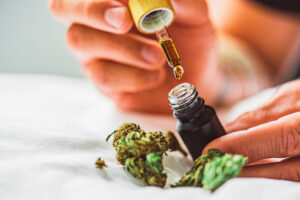Is cannabis a gateway drug to stronger, more dangerous drugs? Is it addictive? Does it affect your brain? It can be difficult to separate the cannabis facts from the myths, particularly because the plant has had a rocky history in the U.S. since it was first cultivated and introduced for recreational purposes in the early 1900s.
However, as legal barriers against medical and recreational cannabis use have been overcome state-by-state over the last decade, consumers are hungry for reliable information. In this infographic, we’ve taken eight of the most common myths about cannabis use and fact-checked them against credible resources.
1. Who uses cannabis?
Pop culture would have us believe that cannabis consumers are grungy, jobless, high-school dropouts. Research tells us otherwise. One study found that among adults age 26 and older, high school dropouts were the least likely to have ever even tried cannabis; adults with some college or bachelor degrees were most likely to have tried it.
2. Is cannabis a gateway drug?
Cannabis is often thrown under the bus as the ground-zero drug that leads people to experiment with and become addicted to both prescription drugs and illicit drugs. The truth is, a number of factors affect addiction, including genetics, psychological dispositions and environmental influences. What you’ll find in the infographic below is research that shows how cannabis is actually used to treat people who suffer from addiction to powerful substances such as opioids.
3. Is marijuana addictive?
Research suggests that cannabis is less addictive than other substances such as nicotine (one of the most addictive), heroin, cocaine and alcohol.
4. Is cannabis stronger today than it was in the 60s and 70s?
The strength of cannabis depends on its THC to CBD ratio, as well as your own biological makeup. See the chart below for the ratio of CBD:THC and the types of effects each typically will produce.
5. Do sativas pick you up while indicas bring you down?
The short answer is, “it depends.” The effects of cannabis strains or cultivars depends on a number of factors, including your own biology, how much you consume, the ratio of CBD to THC in each plant, and the method you use to consume it. There is no scientific evidence that supports the myth that indicas have a sedative effect and sativas an uplifting effect.
The best way to determine how a plant is going to affect you is to try it out at small amounts, observe the effects, and then adjust how much you consume.
6. Does cannabis fry your brain?
The images in the infographic below show one study that found no difference between brains that use cannabis daily and brains that do not.
7. Will cannabis make me infertile?
A few years ago, a study was published that found that borderline infertile men who smoked cannabis became infertile. However, the men in the study were borderline infertile because of genetic and environmental factors.
The research in our infographic suggests quite the opposite of this myth: Cannabis users tend to have a higher concentration of sperm.
8. Is legalized cannabis more expensive?
The last section of this infographic compares the average price of an ounce of cannabis in Canada with the U.S. and shows that in Canada, where cannabis is legal, it costs less than in the United States. The bottom line is, we found no evidence to suggest that once cannabis is legalized that prices increase.
Myths vs. Facts About Cannabis
The infographic below offers more details on the facts about marijuana.
If you have questions about other cannabis myths that we haven’t answered here, explore our resource center. For updated or to become a Happy Valley Insider, enter your email address in the Stay Connected field at the bottom of the page.



CANNABIS MYTHS VS. FACTS FAQ
Compared to other substances, cannabis is less addictive and has the potential to reach a greater number of people without the risk of overdosing or complicated drug interactions. Based on reviews of scientific literature, roughly only one in 10 regular users will become addicted as a result of their usage.
Multiple studies have found no conclusive evidence that cannabis increases drug abuse. For many, cannabis is actually an exit drug (i.e., a substitute for alcohol and other drugs).
“The psycho-social observation that the use of some psychoactive substances (“drugs”) is often followed by the use of other and more problematic drugs has given rise to a cluster of so-called ‘gateway drug hypotheses,’ and such hypotheses have often played an important role in developing drug use policy. The current essay suggests that drug use policies that have drawn on versions of the hypothesis have involved an unjustified oversimplification of the dynamics of drug use, reflecting the interests of certain stakeholders rather than wise social policy. The hypothesis should be retired.” –John Kleinig, PhD, Emeritus Professor of Philosophy in the Department of Criminal Justice, John Jay College of Criminal Justice
While advancements in growing technology, plant science, and cultivar (strain) engineering have resulted in cannabis with potent THC levels, that doesn’t mean all cannabis today is too strong for the casual, low-tolerance consumer.
In fact, low-THC/high-CBD cultivars are gaining popularity among consumers looking for the euphoria and medicinal benefits of the plant without heightened psychoactive effects (CBD keeps the experience more pleasant).
Cannabinoid receptors in the brain activate through anandamide, a neurotransmitter naturally produced by the body when the brain wants to produce a feeling of happiness or euphoria. The main intoxicating ingredient in cannabis, delta-9-tetrahydrocannabinol (THC), has a very similar molecular structure to anandamide.
The chemical makeup and structure of THC allows it to fit in the traditional binding locations of anandamide: the cannabinoid receptors CB1 and CB2.
Researchers from the Harvard T.H. Chan School of Public Health, a preeminent school of public health in the United States, and Massachusetts General Hospital conducted a study in 2018 to determine if smoking cannabis adversely impacts markers of testicular function.
They concluded that men who had smoked cannabis before had a higher sperm count and concentration than those who had never smoked cannabis at all.
The majority of Americans support cannabis legalization, meaning a lot of different types of people of all backgrounds support or enjoy cannabis usage. Among the supporters are doctors, lawyers, CEOs, teachers, and others from all walks of life who turn the “stoner” stereotype on its head.
If you’re new to cannabis, Happy Valley can recommend ideal cultivars and methods so that your first time is pleasurable and gives you the effects you’re looking for.
Learn more about our artisan cannabis or contact our expertly-educated hosts to request information.




